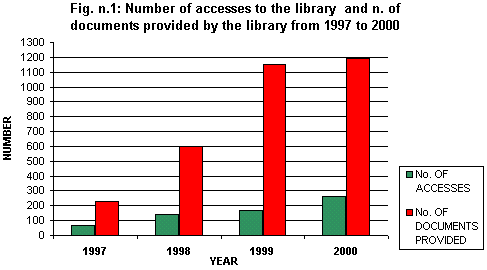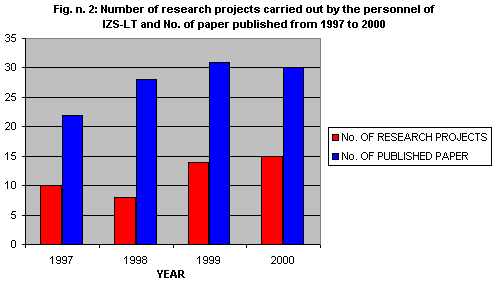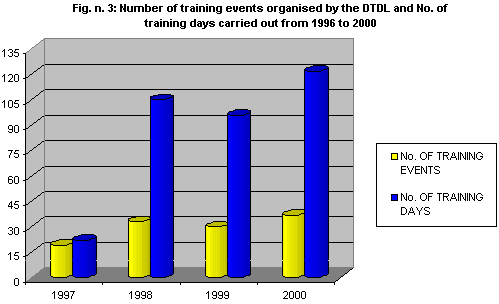
|
|
Introduction
The Istituto Zooprofilattico Sperimentale
delle Regioni Lazio e Toscana (IZS-LT) is a veterinary public board which
performs laboratory trials, scientific research and specialised advisory
acitivities in the following fields: animal health protection, food hygiene
quality control, hygiene in animal breeding and productions.
The situation of the library and
of the training and information activities in 1997 was as follows: the
library had been hardly managed for ten years, moreover a training department
had not yet been established.
In 1997, the dramatic need of the
trainining and scientific updating of the personnel as necessary instruments
to accomplish the mission and the objectives of the Institute was bound
to develop. Such aptitude has been part of a more general program at national
level: in order to improve the efficacy and efficiency of the public boards,
the Government has fostered the adoption of the management system of private
organisation. To reach this target, the Institute top management took up
several actions, thus establishing the Department of Training, Documentation
and Library (DTDL) in 1997.
At present, 4 people are employed
in this Department: one is specialised in biblioteconomy and coordinates
the library activities; two are specialised in training, and another one
works in both fields. The number of our library's users accounts for about
150, which is made up mainly by veterinarians, biologists and chemists.
The library owns 4.000 books, 130 periodicals in subscription, 5 databanks
(CABI, ASFA, ANABS, ScienceDirect, Deagiuridica) and 100 audiovisual
aids (CD-ROMS, slides, videotapes, etc.)
Methods
The Department has contributed to
the change of the policy of the Institute according to the following method:
Acquisition of the resources
of the Department (rooms, tools and instruments), and the training of the
staff.
Strategies
- to motivate the personnel to consider
updating and information as vital instruments in a much more competitive
market
- to supply reliability and authoritativeness
to the Department.
Documentation:
- selective circulation of documents,
rules and laws, training courses brochures etc. both in print as in electronic
form;
- establishment of informative boards
in every territorial department.
Library:
- acquisition and organisation of
the premises;
- reorganisation of the possessed
documents;
- reactivation and extension of
the traditional services;
- increase in subscription to both
print and electronic international periodicals and in the purchase of books,
with particular attention to the subjects supporting the developping change
of the Institute, such as quality, safety, management, training science,
information technology and so forth;
- the issue of a bibliographic bullettin
containing the TOC of the active periodicals;
- activation of the service of document
delivery and interlibrary loan;
- acquisition of electronic resources
(databanks) and specialisation of the inquire and reference service;
- training courses for the library
users to the use of electronic resources;
- constant relationship with other
Italian libraries;
- cooperation to research projects
on electronic resources in the library.
Training:
- Specific training of the staff
belonging to the department;
- Organisation of courses for the
personnel of the Institute about several subjects (quality, safety at work,
management, communication, information technologies, etc.) noteworthy for
the change processes;
- Organisation of workshops and
meetings open to the public about themes ranging from veterinary public
health, quality, etc.;
- Organisation of courses for external
personnel in the agricultural, food and husbandry field as well as for
veterinarians about technical subjects.
All the training activities carried
out by the Department were organised by means of a four step methodology:
analysis of the personnel's training and information requirements; course
planning, fulfilment and evaluation.
Scientific research activities:
Support to the top management of
the Institute as to the research activities of the I.Z.S.L.T.: organisation,
research project revise, linguistic support, research publication archive-keeping.
Results and Conclusions
The Department activities can be
showed by means of some performance indicators so as to give evidence of
a continuous improvement from 1997 to 2000: the number of user accesses
to the library/year (fig.n.1); the number of documents provided /year (scientific
papers, booklets, leaflets, brochures, slides, videotapes, bibliographic
inquiry, articles etc.); the number of research project developped by the
personnel of the Institute/year (fig. n. 2); the number of scientific publications
made by Institute personnel/year; the number of training events organised
by the Department (fig. n.3). Indeed, the library budject increased in
the same period, from roughly 40 million Liras in 1997 to one hundred million
Liras in 2000.
Every year the user satisfaction
has been evaluated by means of anonimous questionnaires focusing on several
aspects of the services supplied (study facilities, availability of documents,
inquiry and reference service, user training, attitudes of library staff,
and others.). An increase in the number of questionnaires filled by the
personnel has been recorded from 1997 to 2001. In the same period, the
user satisfaction has progressively improved, too.
On the whole, the IZSLT has adopted
some of the managerial methods peculiar of private companies and, at the
same time, the personnel has started to change its habit of mind and modus
operandi, thus improving the efficiency and the efficacy of
the services supplied. Furthermore, the above-mentioned development has
involved the application of the Quality System with the subsequent ackwnowledegement
of the certification in conformity with the rules UNI EN 45001.
The Department of Training, Documentation
and Library (DTDL) has significantly contributed to this change. The
continuous and stringent integration between training, documentation and
library, jointed in a unique structure, has dramatically aided the action
of the department as a support to this change.
References
1. Dracos, L., and Cognetti, G. (1995)
La letteratura scientifica: indicatori bibliometrici e bibliografici quali
criteri integrativi per la valutazione obiettiva di una attività
di ricerca. Annali Istituto Superiore di Sanità 31, 381-390.
2. Guilbert, J.J. (1990) Guide Pedagogique.
OMS, Geneve.
3. Vannucci, L. (2000) La formazione
continua del personale nei sistemi bibliotecari. BollettinoA.I.B. (Associazione
Italiana Biblioteche) 40, 61-75.
4. ISO 11620 (1998) Information
and documentation - Library performance indicators. ISO (International
of Standardisation), Geneve.



|